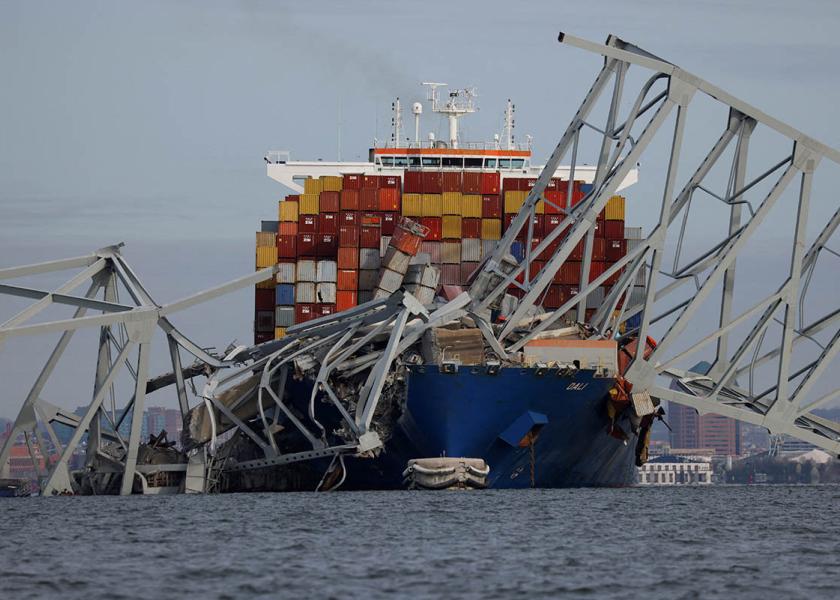California is the country’s largest domestic market for E85 fuel, and the state’s largest ethanol...
Maryland Bridge Collapse Could Affect Agriculture

Customers from the East Coast to the Midwest who were expecting goods shipped in via the Port of Baltimore could see significant cost increases as a result of the recent collapse of the Francis Scott Key Bridge in Baltimore that has blocked access for ships to the port.
Baltimore is the largest entry point in the U.S. for large agriculture and construction equipment like tractors, farming combines, forklifts, bulldozers and heavy-duty trucks that are bound for the Midwest, according to DAT Freight and Analytics, a freight-exchange service. “Any disruption to agriculture and construction equipment shipments would come at a particularly bad time as Midwest farmers have begun to plant this year’s crops, while construction picks up in colder climates as the ground begins to thaw,” said Dean Croke, principal analyst with DAT.
Lancaster Farming’s Philip Gruber reported that while there could be a disruption moving forward for farm machinery, “dealerships are well stocked these days, with manufacturers having overcome the pandemic’s supply chain problems.” “As a result, the port blockage may have little effect on equipment inventory in the short term. But the longer it takes for Baltimore to recover, the greater the risk that inventories will draw down and prices will rise.”
Ag commodities likely not as affected
AgWeb’s Cheyenne Kramer reported that, while the port closure could affect farm machinery shipments, there likely won’t be as much disruption for shipments of U.S. agriculture commodities.
“The Port of Baltimore doesn’t accommodate a lot in terms of agricultural exports,” says Mike Steenhoek, Executive Director at the Soy Transportation Coalition. According to Kramer, “Sugar would be No. 1, then soybeans No. 2, grain products including corn and wheat are No. 3 and then coffee and grocery items.”
According to Steenhoek, “The Port of Baltimore exports around 200,000 metric tons of soybeans. In comparison, the Mississippi Gulf near New Orleans is the No. 1 export region for soybeans and exports 35 million metric tons.”
Reuters’ reported Tuesday that “imports of agricultural products totaled 3 million tons last year, including 1.2 million of sugar and salt, as well as gypsum, fertilizers and forest products,” according to Ishan Bhanu, lead agricultural commodities analyst at Kpler. U.S. sugar company ASR Group, which operates a refinery near the center of Baltimore, said it does not expect short-term impacts to its operations.”
Response and recovery
Progressive Farmer’s Mary Kennedy reported that President Joe Biden spoke on the bridge collapse last Tuesday afternoon, saying the federal government will send all the resources needed by the city and state. “It’s my intention that federal government will pay for the entire cost of reconstructing that bridge," he said and added that he expects Congress to support the effort.
In addition, Maryland Governor Wes Moore said in a press release: “I have declared a State of Emergency here in Maryland and we are working with an interagency team to quickly deploy federal resources from the Biden Administration.”
“The Port of Baltimore said it remained open with trucks still being processed at the marine terminals,” Gruber reported. “But port leaders did not know how long boat traffic would be suspended.”
EDITOR’S TAKE:
This was a tragedy of epic proportions. The loss of human life, of course, tops the list of why it deserves that designation. In addition, Baltimore is a major east coast facility, especially for autos and agricultural equipment. Plus, it could take years to completely get back to “normal” and rebuild the bridge. The good news, if there is any, supply chain companies are already making alternate plans for getting products in an out of the country. Not to say there won’t be disruptions, because there will be, but hopefully they can be minimized. Be sure you are keeping a close eye on how the situation in Baltimore will impact your business then devise a way to communicate that to all the farmers/ranchers in your area so they can plan ahead as well. They will appreciate and respect you for keeping them informed.







